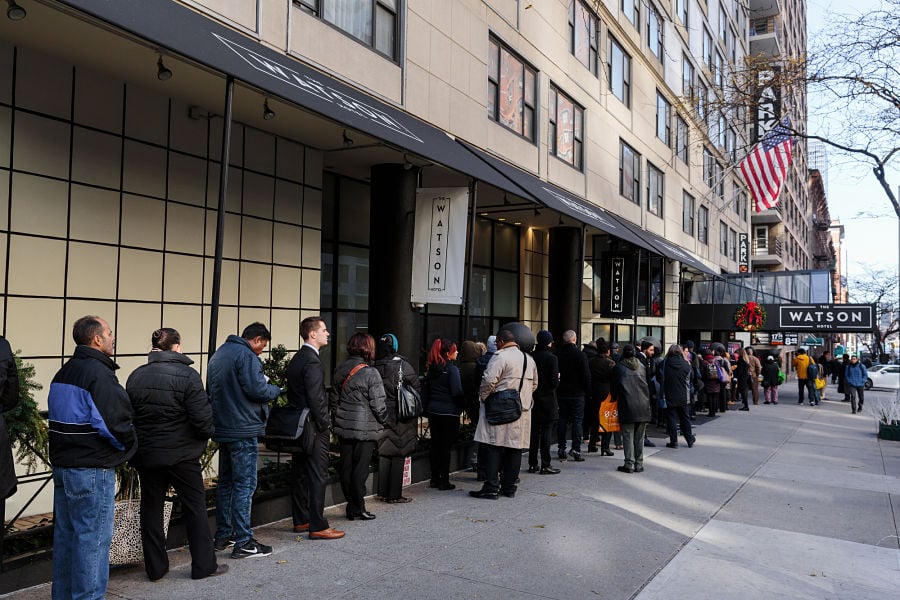

Growing up in Detroit in the 1960s and 1970s, and then returning there for visits today, feels like a tale of two cities. In my childhood, relatives and neighbors were employed in blue-collar jobs. Working hard, they earned enough to own their homes and help send their kids to college, while looking ahead to a combination of pension plans, Social Security and personal savings to fund a reasonably secure retirement.
But in today's Detroit, members of the working and lower-middle classes find it difficult to accumulate sufficient net worth to reach reasonable long-term goals. Even those fortunate enough to have full-time employment and health benefits struggle to save and invest for the future, even in the smallest possible amounts.
Unfortunately, this fits a national pattern. Despite recent economic growth, lower-income Americans undeniably face tougher circumstances than the prior generation, and many have given up on long-range financial goals, living paycheck to paycheck instead.
Clear mission for our industry
This creates a historic moment for our industry to adopt a clear social mission to extend the important work we do for mass-affluent and high-net-worth clients, and help guide economically vulnerable individuals and households toward a more secure future.
Let's start by having leaders across all wealth management-related firms recognize the need for the launch of an industrywide, inclusive umbrella organization, exclusively dedicated to helping lower-income Americans maximize their chances of achieving a better future for themselves than what they may currently see ahead.
Although most firms and advisers do a great job of supporting various worthy charitable projects, the industry as a whole has not come together in a meaningful way to address this particular issue, outside of balkanized public financial literacy programs.
Goals-based planning
Efforts by firms and advisers to help this segment of our society must emphasize goal-based planning, as this speaks to why so many people have given up hope about their finances.
In today's environment, lower-income workers obviously know they're not earning much money, even as living costs rise. When they try to figure out what to do on their own, the cacophony of voices, concepts and noise from the media and the internet can become overwhelming.
A natural reaction is to just stop thinking about one's financial future altogether.
But an umbrella organization for our industry, empowered with this social mission, could find new ways to adapt goals-based financial planning to help people in this segment push out all the unnecessary noise, and set basic goals that are easy to track and implement — each week, each month, each year.
Pro bono assistance
Of course, none of this works if you can't get advisers to spend time helping lower-income Americans.
One solution is for independent firms to set incentives for advisers to regularly do pro bono work, similar to how law firms of all sizes make pro bono hours for worthy causes or needy clients an expectation for their professionals.
But partnering closely with regulators and industry associations, firms could structure new ways to encourage advisers to contribute pro bono time and expertise to help lower-income households.
One example is to let time spent by advisers supporting lower-income pro bono clients count toward continued learning and education requirements for the maintenance of certain securities licenses and professional designations.
Third-party providers
Another step is to involve third-party service and solutions providers in this broader mission. When firms and advisers make technology selections or work with service providers such as business consultants, they should invite these contacts to participate in activities coordinated by the new industrywide umbrella organization in support of their advisers' pro bono, lower-income clients.
Leaders of RIAs and IBDs, for instance, might ask their tech vendors to customize existing budgeting and investment digital tools with low-income workers and households specifically in mind.
Similarly, advisers who direct assets to 501(c)(3) charitable organizations can ask their outside partners to modify those tools as well. By teaming with third-party solutions providers, advisers could serve their pro bono, lower-income clients much more efficiently.
A future worth supporting
The Detroit of my childhood and the Detroit of today are separated not just by decades of time, but by a lack of hope that once was, born out of confidence that there is a future worth striving for, especially among lower-income Americans.
There are no easy solutions to this issue, but there is a path forward for our industry to play an outsized leading role in building a better future for a wider base of people throughout our country.
Indeed, a new social mission that captures our industry's imagination while driving enhanced public relevance for our firms and advisers could create new excitement, optimism and energy that translates into new ideas and innovation that we might never have identified otherwise.
That sounds like a future worth supporting.
Larry Roth is managing partner at RLR Strategic Partners, a growth strategy consultancy focused on the wealth management space.

Relationships are key to our business but advisors are often slow to engage in specific activities designed to foster them.

Whichever path you go down, act now while you're still in control.

Pro-bitcoin professionals, however, say the cryptocurrency has ushered in change.

“LPL has evolved significantly over the last decade and still wants to scale up,” says one industry executive.

Survey findings from the Nationwide Retirement Institute offers pearls of planning wisdom from 60- to 65-year-olds, as well as insights into concerns.
Streamline your outreach with Aidentified's AI-driven solutions
This season’s market volatility: Positioning for rate relief, income growth and the AI rebound
